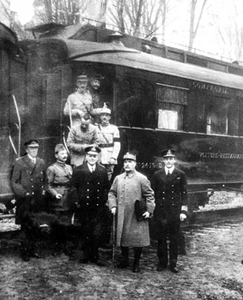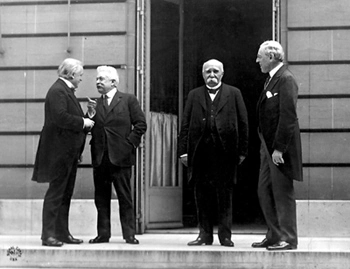Austria signed an armistice on 3 November, and the Habsburg monarchy was no more. For Italy also, the war was over.
Turkey also surrendered. Damascus, part of the Ottoman Empire for 400 years, fell to the British on 1 October. More defeats followed and finally on 30 October, Turkey signed an armistice. The once powerful and far-reaching Ottoman Empire was finished.
German admirals, defiant and not ready to accept defeat, prepared to send their fleets out once more to do battle against the Royal Navy. On 29 October, sailors based in Kiel, sensing this to be a futile and suicidal mission, mutinied. The mutiny quickly spread, the province of Bavaria established a Socialist republic along Soviet lines. For the new German government, a stop to hostilities was now a necessity not just to end war but also to avert revolution.
Armistice
Hindenburg and Wilhelm Groener (Ludendorff’s replacement) went to see the Kaiser who had bolted to army headquarters in the Belgium town of Spa. Hindenburg, the monarchist, bowed his head in shame and left Groener to do the talking. The Kaiser remained defiant until the news came through: in Berlin, Prince Max had proclaimed a Socialist republic and had passed the chancellorship to the Social Democrat, Friedrich Ebert. Thus, on 10 November, Kaiser Wilhelm II abdicated. The 500-year rule of the Hohenzollern dynasty had come to an end. The Kaiser fled to the Netherlands and into exile, never again to step on German soil.

The French-German armistice delegation in the forest of Compiègne,
11 November 1918 (Ferdinand Foch second from right)
On 9 November, Matthias Erzberger, representing Ebert’s new government, met Foch and the French delegation in a railway carriage in the woods of Compiègne. Erzberger had come to seek an armistice; Foch to dictate its terms. Wilson’s Fourteen Points of leniency had gone – instead the French made such demands that Erzberger protested. Germany would have to forgo most of its military, large swathes of territory, and annul the Treaty of Brest-Litovsk. From Berlin, Ebert brushed aside Erzberger’s protests and told him to sign.
Signed at 5 am, Paris time, the Western Front Armistice came into effect at 11 am – ‘the eleventh hour of the eleventh day of the eleventh month’. Tragically, during the intervening six hours there were many more deaths. The last recorded death was that of US soldier, 23-year-old Henry Gunther; as he charged, bayonet drawn, astonished German troops tried to warn him, before shooting him down. The time was 10.59. ‘Almost as he fell, the gunfire died away and an appalling silence prevailed.’
Paris Peace Conference
The Paris Peace Conference opened on 18 January 1919. Thirty-two countries were represented, including the new nations that had emerged from the break-up of the Austrian–Hungarian empire, but proceedings were dominated by Woodrow Wilson, Georges Clemenceau and David Lloyd George.

Paris Peace Conference, 1919
(L-R: David Lloyd George, Vittorio Orlando, Georges Clemenceau, Woodrow Wilson)
The conference produced five treaties, one for each of the defeated Central Powers, none of whom were in attendance, and each named after a Parisian suburb. The Treaty of Sevres officially closed down the Ottoman Empire and virtually abolished Turkish sovereignty. The Turkish government was ready to sign but followers of the nationalist leader Mustafa Kemal rebelled. The resultant Turkish War of Independence saw Kemal come to power to establish the Republic of Turkey in 1923. The Treaty of Trianon imposed strict punishments on Hungary. New boundaries were drawn in the Balkans, the Middle East and Africa.
Italy, lured into war by territorial promises, was treated dismissively during talks, causing its prime minister, Vittorio Orlando, to walk out. Italy was disappointed by its spoils of war. Orlando, heavily criticized by Italy’s rising right, led by Benito Mussolini, was soon ousted.
The terms of the German treaty, the Treaty of Versailles, were particularly harsh. On being presented with the document, Germany was given three weeks to comply.
1 comment